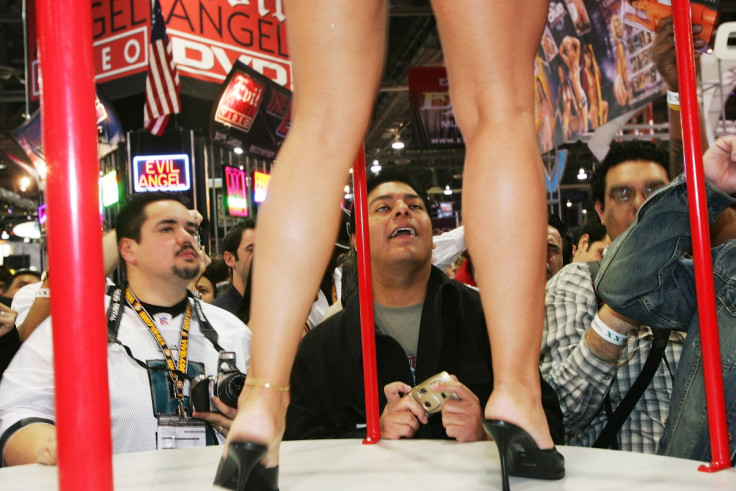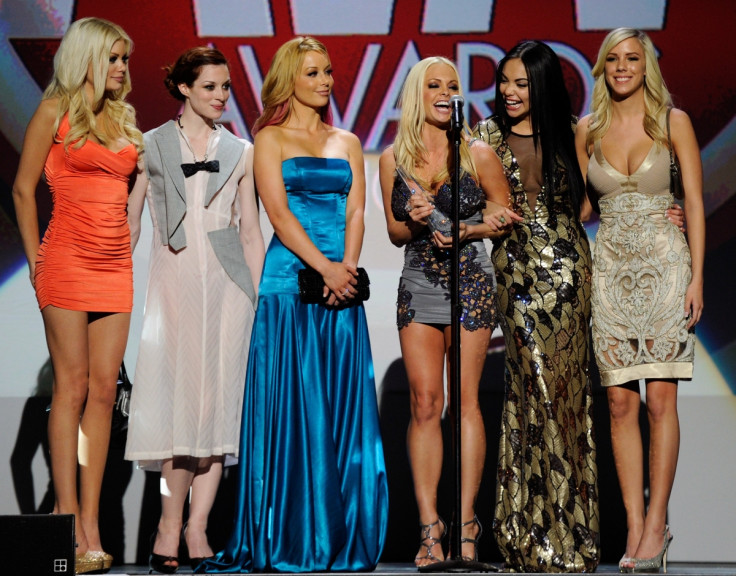Start paying for your porn, or I will stop making it

The year I joined the adult industry, 2006, I attended the infamous Adult Entertainment Expo as a model signing for Hustler magazine. Hustler had left a hardcore contract offer on the table for me, and when I hesitated they'd said, "Just see what it's all about – you'd be surprised at your options."
Porn was money that year. The convention filled the largest open floorspace at the Venetian Hotel and Casino in Las Vegas. Fans were packed like salty little fish between aisles, and booth space was prime real estate. Superstars like Tera Patrick and Jenna Jameson occupied the largest booths, replete with racks of their self-funded and –produced DVDs. They wore diamonds and designer heels, and I remember watching the way they walked and the throng of people who followed their every move and realising they were not much older than me. Only a handful of years before, they had been in the same situation I was in.
The week culminated with the AVN Awards show that Saturday night. The red carpet spanned the length of the casino, lined with red velvet ropes and brass stands. There were more designer heels and diamonds, now joined by floor-length gowns and hard-bodied men in tuxedos. Camera crews rolled footage of every move those stars made and the show that followed was loud and glitzy. As the winners were called the feel of joy and disappointment was palpable.
The executive elbowed me playfully and said: "Don't worry. Porn is recession-proof."
Everything mattered. When it was over, the stars went off to their respective parties—anyone who was anyone was taking a pay check just for appearing at some nightclub back then — and then retired to their suites. New stars made on the awards stage went home with big-money contracts. Deals were made. Everyone buckled down to do it bigger and better for next year.
Aside from being starstruck by the sparkle of the adult industry that year, I had a few good reasons to throw myself into it. One of them was financial. I'd made some early money as a stripper in my hometown and had tried to invest it in real estate, only to get caught in the same trap that the rest of America fell victim to at that time.
I told an adult studio executive that story as I weighed the pros and cons of entering the industry. Con: a lifetime of insults hurled back from society. Pro: a chance at succeeding early in my lifetime. The executive looked at me like my notions were cute when I told him the kind of money I'd lost, then elbowed me playfully. He said: "Don't worry. Porn is recession-proof."
I started working my first job as a cashier at my local McDonald's at age 15 for $7.25 an hour. I remember my first payslip, the way I tucked it into the bank and then piled on more and more and more. By the end of the summer, I had nearly $800 in my account after taxes. That amount was, coincidentally, about the same amount that I made in cash my first night working at a strip club.
When I began performing in adult films, I made three times that amount in one day. The job was easy, the people were kind and the set was catered. At 20, I didn't know what to do with that kind of money. I put it in the bank and sat on it. Someone whispered in my ear how much more I could demand in another year.
By the time the expo rolled round in 2008, I was beginning to grow into the shoes of a brand-name performer. I had a big studio contract and was scheduled to sign at a front-and-centre booth along the main aisle of the convention floor. Already my scene rate was higher, I was developing a website of my own, toy companies were talking to me about licensing deals and I was beginning my first tour of appearances at strip clubs around the country. Everything was looking up.

But when I got down to the show floor on that first day something was noticeably different from the conventions of years past. Production studios were tightening their belts on the booth theatrics. The aisles had elbow room. At the conference table in the centre of the booth space, a few people sat down in suits and began to discuss in earnest the problem with video download speeds and how they'd sped up.
There was a great deal of concern over the "savvy user," more commonly understood as the individual who knew enough and had the internet resources to rip a digital file online so that the work investment of stealing the file was cheaper than the cost of just buying the movie. Those users were growing in number every day.
YouTube was growing rapidly back then, too. As a form of self-promotion, I remember uploading videos that were less than ten minutes in length because that was the maximum runtime YouTube allowed. The cost of hosting was high. YouTube had also done its best, under threat of legal action, to engineer strict policies protecting copyrights. I couldn't, for example, upload ridiculous footage to the beat of a Bob Marley song for fear of having my account suspended and the video deleted permanently.
My impression around that time was that a "YouTube of Porn" couldn't be all that threatening because of the costs associated with hosting, the low-quality video feed and, more than anything, the copyright laws that we were all protected under, whether the government approved of our industry or not.
A "YouTube of Porn" is exactly what happened, though. Major streaming sites sprung up alongside the growing torrent sites. While the quality and length of video footage didn't compete well with what could be purchased, the free clips did provide a solution to a growing population of consumers in a growing recession – it also negated the need to make the embarrassing trip out to their local adult video stores. No one had to 'fess up to anyone else about what he or she was watching. Nothing was showing up on credit card statements, and viewers didn't have to worry about being rebilled for memberships they'd lost track of.

Consumers flocked to the tube sites, and the growing traffic made the tube sites stronger and better able to host longer and higher quality clips. Never mind that the sites made no distinction between the content they had the right to host and the content they didn't.
The AEE show in 2011 was the last year our convention was held at the Venetian. Particleboard walls were put up along the outskirts of the show floor to section off the mostly unused convention space from the ever-shrinking footprint that the expo now covered. Both Jenna Jameson's company and Tera Patrick's had closed up shop. Other top production houses, which at the turn of the century had reliably reported seven-figure profits year after year, had nothing left to show but old video catalogues and a monthly warehouse bill for the storage of DVDs that had been returned from retailers. Some companies abandoned their product completely.
The availability of contracts for choice performers had dried up, and I held one of about ten still remaining in the industry. I was lucky. For the first time in the history of the adult industry, the supply problem was reversed. In the past our industry was always hungry for attractive and ambitious performers. In 2011, the body of willing and available talent was far greater than the body of available work from the production houses. Many women turned to cam sites or escorting, while others left the business completely.
Lawsuits, of course, were filed. Adult production houses did their best to band together against the sites pirating their copyrighted material, but jurisdiction was sketchy and enforcement was worse. Whereas Hollywood had power, resources, lobbyists and emotional appeal on its side, the adult industry was scattered and mostly considered a product better left in the gutter. A common sentiment when performers complained about the impact of piracy on their lifestyle was "serves you right", as the very people who wagged a moralistic finger at the situation ramped up consumption of the product.
Ironically, 2011 was also the height of the period when the major tube company that had bottomed out the value of the big studios turned around and bought those very studios for pennies on the dollar from their worth just five years prior. The company I was contracted with became one of those studios, and my contract was transferred with it.
In order to stay profitable, the remaining studios have mostly survived on drastic budget cuts and cornering niche markets. Production days very commonly run 12 to 16 hours, and many crew jobs are cut to make a budget work—jobs like catering, makeup, lighting, sound, art direction, and most of the camera crew. What is left is often a single person holding a camera in his own house, with performers who are working below their rate. This may sound like an argument for empathy for the adult industry, but it's not. It's an argument for the economy. These are jobs that were once filled, that a decade ago created very decent living wages for a very large group of people. They had families and roots in the community.

I quit my contract. It was a deal that I knew I would never get back, but my personal life and the state of the industry collided in a way that left me ready to move on. Today I work side by side with my partner —a fellow adult industry veteran. We make a good living wage together, but it is a constant battle to create content that consumers are still willing to pay for, filled with long workdays and much uncertainty. The nature of the industry today has prevented new talent from achieving the stardom of years past, and that works in our favour – allowing us to continue to use the brand names we were able to build before this great change.
Where the industry goes from here is the question on everyone's lips. Some tube sites, such as PornTube.com, run in ways that are legal and fair by taking measures to prevent copyrighted material from appearing on their site without the copyright owner's permission. Others live by their own laws, knowing that the battle against them is a harder one to fight every day. The bigger battle though, now, is the battle against the entitlement that has been taught to a generation of porn consumers. The attitude, because our work has been stolen and freely distributed in such large amounts, is that porn should be free.
But porn should not be free. Not unless the needs of the people working to create it are also met for free and a system of free resources stems back further from there. We do not live in that world, though. We live in a capitalistic world. If an industry dies because of a restriction in demand, that is a natural evolution in a capitalistic market. But if it dies because of blatant theft, then there exists a flaw in the pattern of laws and enforcement of the governments designed to uphold the system.
My partner and I have chosen to stay in this industry for as long as there is still a liveable wage to be earned. He has sunk two decades already into porn, and as a performer still remains one of its most valuable assets. This year I will have invested a decade of my life into the industry as well. Were I armed with the connections, experience, and specific savvy that I've earned over these ten years back in 2006, my life would be very different. I might have owned a studio that took up the centre of a convention hall, or contracted a string of other ambitious women who would in turn make empires for themselves. This system as it stands is unsustainable, though, and I haven't lost hope that the changes that shake out in the future will create a fair and healthy market once again.
Kayden Kross is a ten-year veteran of the adult industry. Today she directs projects with her partner, Manuel Ferrara, and runs TRENCHCOATx.com.
© Copyright IBTimes 2025. All rights reserved.






















